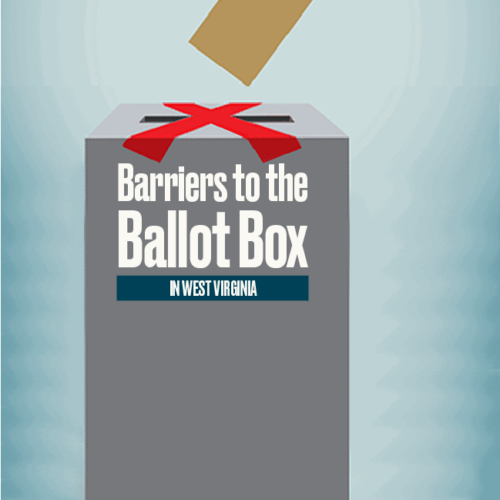Introduction
West Virginia is letting all voters cast their ballots by mail this year, setting aside a rule that normally restricts access. But though the state sent absentee ballot applications to all voters for the primary, it’s not doing so for the general election.
State officials say they set up an online portal to make applying more efficient. But the switch strikes Julie Archer, coordinator of West Virginia Citizens for Clean Elections, as a recipe for voter confusion. And the state has missed other opportunities to boost its low voter turnout, she said: “There’s a lot of room for improvement.”
Sign up for The Moment newsletter
Our CEO Susan Smith Richardson guides you through conversations and context on race and inequality.
Here’s a look at some of the most significant updates on restrictions to voting rights and access in the state:
Mail-in ballots
Most states allow any voter to cast an absentee ballot. West Virginia is not among them, requiring that residents fall into one of several categories to qualify, such as temporarily living elsewhere.
This year, though, the state is allowing a COVID-19 excuse that expands the option of voting by mail to all registered voters. That gives residents a way to avoid in-person voting and the risk of infection that could bring.
It’s good news for voter access, and Archer would like to see that change made permanent. But she’s concerned about the state’s decision not to automatically mail ballot applications for the general election, as it did for the primary.
“Some people are going to be waiting for something that’s never going to come,” said Archer, whose group is a coalition of organizations working to increase accountability and transparency in elections. “If they wait too long, then with the potential delays with the Postal Service, you just worry that some people will be disenfranchised because of the confusion.”
West Virginia Secretary of State Mac Warner said he hasn’t heard of any voter confusion. The applications sent in the primary — which also served as notice that the date of the election had changed — overwhelmed county clerks and in some cases came back with illegible addresses, he said.
“They said, ‘Please don’t do that again,’” he recalled.
His office opted to launch a portal in August for people to apply for a ballot online. Clerks can get the ballots out faster because they’re not waiting for the applications to come back by mail, he said.
West Virginia has one of the lowest rates of internet access in the country, however. The more than 100,000 voters who requested an absentee ballot as of Oct. 6 account for less than 10% of all registered voters, with three weeks left to go before the deadline. Requests must be received by Oct. 28.
Three weeks before the June primary, West Virginia had double the number of ballot requests. The spread of COVID-19 in the state, meanwhile, is far higher now.
Warner attributed the drop in absentee ballot requests to people getting accustomed to living amid a pandemic and feeling more comfortable with the idea of voting in person, whether on Election Day or during the state’s early voting period.
In more than 20 states, elections officials are either mailing absentee ballot applications automatically or skipping that process and mailing the ballots.
Many states are also offering drop boxes as a way for voters to return their ballots without relying on the mail. West Virginia isn’t among them. The secretary of state’s office said West Virginia law bars this option, pointing to language that says voters hand-delivering ballots — something they can do now by going to their county clerk’s office — can bring only theirs and one other person’s.
“You could imagine it, if there were a drop box, one [voter] could take five or six,” said Jennifer Gardner, a spokesperson for the West Virginia Office of Secretary of State.
Voter registration
West Virginia’s voter registration deadline is 21 days before an election (this year, that’s Oct. 13). It’s not the earliest cutoff point nationwide, but roughly 25 states allow later registrations, some on Election Day, according to the Brennan Center for Justice.
“We have one of the lowest turnout rates in the country,” Archer said. “When you look at other states that have implemented policies like same-day registration, … those policies have an impact.”
A 2016 law directed West Virginia to update its motor-voter system so people interacting with the Division of Motor Vehicles opt out of registering to vote, rather than opting in. But that’s still not available. The state blames the delays on an old DMV mainframe computer.
“It’s supposed to go into effect next year — finally,” Archer said. “We hope.”
Read more in Money and Democracy
US Polling Places
In Ohio, voter list purges and strict ID law could suppress turnout
Lawsuits target the battleground state after more than 72,000 absentee ballot applications were thrown out in this year’s primary.
US Polling Places
Felony disenfranchisement is one of the only remaining barriers to voting in Washington
Automatic voter registration and same-day registration make it easier for residents to cast a ballot.


Join the conversation
Show Comments